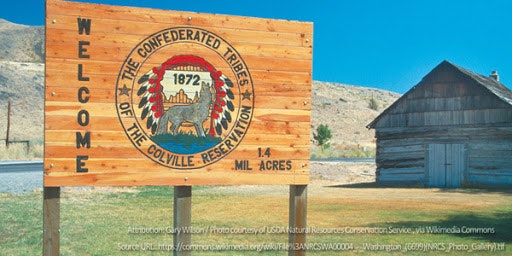How One Student Is Raising Awareness for Better Broadband Access on Tribal Lands
Ferry County, WA (June 8, 2020) - Broadband (high-speed internet) connectivity has become a necessary resource for people in their day-to-day lives. But what about those who struggle to get internet access? Are they able to do the same things as those who have a strong connection? The answer is no.
One population in particular that has poor broadband connection: indigenous people living on tribal lands and those in remote rural areas like Ferry County.

Across the United States, many rural and tribal lands have fallen behind and become extremely economically distressed. The Colville Indian Reservation in Ferry County, Wash., is one such area. This community has the state's highest rate of unemployment, food access challenges, extreme poverty, and designated as a broadband desert.
The disenfranchisement of native tribes has negatively affected its people in many ways. One of the biggest problems these people face is poor internet connection. According to the American Library Association, 7 in every 10 residents on rural and tribal lands remain without access to fixed high-capacity broadband and are cut off from educational and economic opportunities.
“As we travel for work and school, connectivity always varies and often is not available,” said Trevor Lane, associate professor at the Washington State University Extension and resident of Ferry County. “I am often reminded of how challenging it is to raise a child as a single parent, especially with a lack of connectivity when traveling or working offsite.”
Why Tribal Lands Need Access
Members of tribal communities across the country need broadband access just as much as anyone else. High-speed internet can help the people living in these areas find better jobs, access healthcare, and tap into educational opportunities. Because tribal communities are some of the least connected groups in the country, it is hard for them to reach out for help and, as a result, they are often more isolated than other populations.
The coronavirus pandemic has also shown why broadband is a necessity in these areas. Without the internet, students in these communities fall behind in school because they do not have the main resource for remote learning: the internet. In Ferry County, poor internet service only allows for consumption and not production or creation. This holds back the majority of the community and does not let them live or work to their full potential.
“It is important we honor the voices and hopes of our ancestors, but tribes have been decimated and dislocated,” said Lane. “We need to help bring tribes together and create a sense of connectedness that leads to language and culture exchange, especially for those like my son Talon who are dislocated from the tribe in Oklahoma.”
One Student Willing To Make A Change
To help raise awareness about this growing issue, Talon Callahan Lane, a young member of the native community, decided to take matters into his own hands. Talon is a Ferry County 4-H digital ambassador in Washington for the Microsoft & 4-H Tech Changemaker program.
“I wanted to become a digital ambassador so I can help kids like mehave broadband so that they can grow and compete in this rapidly evolving society,” he said.
Talon became a Tech Changemaker serving as a digital ambassador in March 2019. Since then, he has advocated and spoken up for other kids who have the same issues of poor internet connection on tribal lands. Although Talon, an enrolled member of the Cherokee Nation, has not grown up on a reservation and has social and economic privilege, he has been surrounded by poverty, unemployment, and food scarcity most of his childhood near tribal lands. Talon has used YouTube among many other platforms to spread his word. You can watch his YouTube video for Tech Changemakers on his channel here: Ferry County Tech Changemakers.

“We are advocating for rural and tribal broadband so kids like me can compete with urban areas and have access to the same resources,” Talon said.
How You Can Help
While Talon uses his voice to bring awareness to this situation, what can youdo to make a difference? You can stay updated and informed on broadband-related issues by visiting the Connected Nation websiteor follow us on social media:
- Facebook: Connected Nation
- Twitter: @connectednation
- Instagram: @connectednation
You can also check out these related articles:
- For Tribal Lands Ravaged by COVID-19, Broadband Access Is a Matter of Life and Death
- Tribal Broadband: Status of Deployment and Federal Funding Programs
- Thin on Broadband: Tribal Areas Still Struggle With Lagging Technology

About the Author: Lily McCoy is Connected Nation’s Communications Social Media Specialist. She provides support to the Communications Department through social media outreach and writing. She also adds a source of creativity to the team with a background in personal relations and marketing. Lily has bachelors in corporate and organizational communications from Western Kentucky University.







